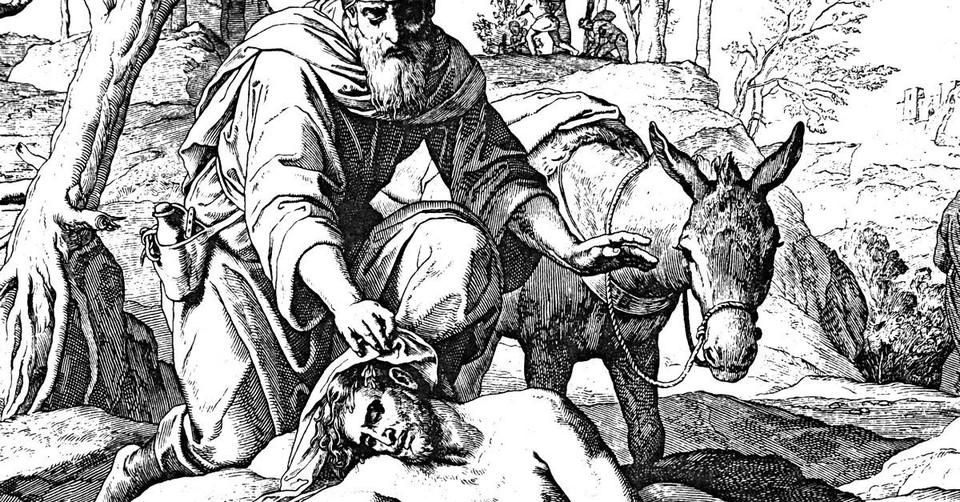The Parable Of The Good Samaritan: 5 Lessons Learned

England’s former Prime Minister Margaret Thatcher once observed, “No one would remember the Good Samaritan if he’d only had good intentions – he had money too.” Of course the Good Samaritan was not an actual historical figure; he was a fictional man in a story that Jesus told to a religious legalist who was trying to justify his unwillingness to walk the walk. The story goes like this:
A Jewish man was traveling on a trip from Jerusalem to Jericho, and he was attacked by bandits. They stripped him of his clothes, beat him up, and left him half dead beside the road. By chance a priest came along. But when he saw the man lying there, he crossed to the other side of the road and passed him by. A Temple assistant walked over and looked at him lying there, but he also passed by on the other side. Then a despised Samaritan came along, and when he saw the man, he felt compassion for him. Going over to him, the Samaritan soothed his wounds with olive oil and wine and bandaged them.Then he put the man on his own donkey and took him to an inn, where he took care of him. The next day he handed the innkeeper two silver coins, telling him, ‘Take care of this man. If his bill runs higher than this, I’ll pay you the next time I’m here.’ “Now which of these three would you say was a neighbor to the man who was attacked by bandits?” Jesus asked. The man replied, “The one who showed him mercy.” Then Jesus said, “Yes, now go and do the same.” Luke 10:30-37
Here are 5 Lessons we can learn from the Good Samaritan Story
1. The good samaritan was willing to get involved.
We may quote scripture and recite platitudes on love and God, but unless we are willing to get involved in the lives of others, we are only blowing smoke. The Samaritan treated and bandaged the wounds. He set the injured man on his donkey. He took him to an inn and cared for him throughout the night. The Samaritan could have said to himself, “I give regularly to my church. I donate to the Salvation Army every Christmas. I have done my part.” But he didn’t. As the scriptures say, he had compassion...and he acted on it.
2. The good samaritan ignored racism.
Even though he was considered a “despised Samaritan,” he rose above such shallowness to care for a fellow human being. I compare the Samaritan’s actions to an American 19th century slave showing compassion to a plantation owner or a Jewish prisoner demonstrating concern for a Nazi guard during WWII.
3. The good samaritan had money.
Margaret Thatcher was absolutely spot on: this was a man who managed his money. He undoubtedly lived on a budget, spent less than he made and maintained a contingency fund for unexpected expenses. My wife and I fully realize that we need to be very intentional if we are going to have such a giving fund, so we place cash into a “bless envelope” every month. Knowing that money is there has raised our antennae to the needs around us.
4. The good samaritan had a good name.
One wonders if the Samaritan had been to that inn before, perhaps paying for some other needy person’s stay. We know this: the innkeeper trusted the Samaritan, probably because he had proven himself to be trustworthy.
5. The good samaritan was generous.
The Samaritan didn’t know how long the injured man would be laid up, but I am guessing (because the text said the attack left him “half dead”), that it could be a prolonged stay. At any rate, the wellbeing of this stranger was more important to our Good Samaritan than whatever the cost might be. Again, this generosity would never have been possible if he hadn’t had money in the first place.
The central message of this story is that, if we are to be good neighbors, we need to be more like the Samaritan. The implied message is to get strong financially and stay strong financially so we can have the means to act on our good intentions.
Jesus concludes with this admonition, “Go and do likewise.” When we learn this lesson, we, and the world around us, will be better for it.
How will you follow Jesus’ challenge to “Go and do likewise”? What additional lessons from the Good Samaritan can you think of? Leave your thoughts in the comments below!
This article originally appeared on Christian Personal Finance. Used with permission.
Joe Plemon started Plemon Financial Coaching in 2006. He has been the Money Columnist for the Southern Illinoisan newspaper (circulation 30,000) since October, 2007 and blogs at Personal Finance by the Book.
Photo Credit: GettyImages/Ruskpp
Originally published May 03, 2021.







